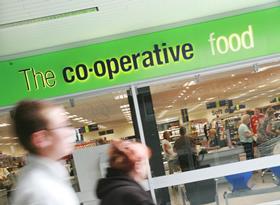
The British grocery market returned to slow growth after a disappointing Christmas period, delivering a take-home sales increase of 0.2 per cent.
While the overall grocery market’s growth has been slight, New Year health kicks have contributed to a strong performance across fresh foods, the latest grocery share figures from Kantar Worldpanel, published today for the 12 weeks ending 31 January 2016, found.
For the first time since 2011, The Co-operative was the fastest growing non-discounter, increasing sales by 1.4 per cent. The convenience-focused grocer grew its own-label sales by 7 per cent, with sales up fastest in the fresh and chilled part of the store.
Fraser McKevitt, head of retail and consumer insight at Kantar Worldpanel, said: “Consumers are clearly striving for a healthier start to the year and have turned to fresh foods - particularly fruit and vegetables, which have both grown sales by 5 per cent.
'Given that they’re still experiencing like-for-like deflation it’s a significant revenue growth for both categories, shared across both traditional and discount retailers. Similar growth has been seen in nuts, fresh poultry and fish.”
Meanwhile, recent trends at Aldi and Lidl continue. McKevitt said: “Both the discount retailers saw their growth accelerate - Lidl to 18.7 per cent and Aldi to 13.7 per cent. Both saw their share of the market increase by 0.7 percentage points, with Lidl’s rising to 4.2 per cent and Aldi’s to 5.6 per cent - a dip from the 10 per cent combined market share high they experienced at the end of 2015. We can expect both retailers to continue to take market share this year as they fulfil their plans for more outlets.”
Sainsbury’s increased its sales for the sixth period in row, growing by 0.6 per cent with a resulting market share increase of 0.1 percentage points to 16.8 per cent. Meanwhile Tesco showed signs of improvement - while revenues fell by 1.6 per cent, these are the best numbers posted by the retailer since September of last year.
At Morrisons, the sales decline lessened to 2.2 per cent, while market share fell by 0.3 percentage points to 10.8 per cent. The retailer’s revenues will continue to reflect its disposal of 140 M Local stores and the closure of some larger outlets through the rest of 2016. Asda’s recent announcement of renewed price cuts has not yet had time to materially affect its latest 12 week figures, with sales falling by 3.8 per cent and share falling back to 16.2 per cent.
While Waitrose’s market share remained static at 5.2 per cent, sales increased by 0.1 per cent. This makes it the 91st consecutive period of growth for the retailer - the longest current run of success for any supermarket.






No comments yet